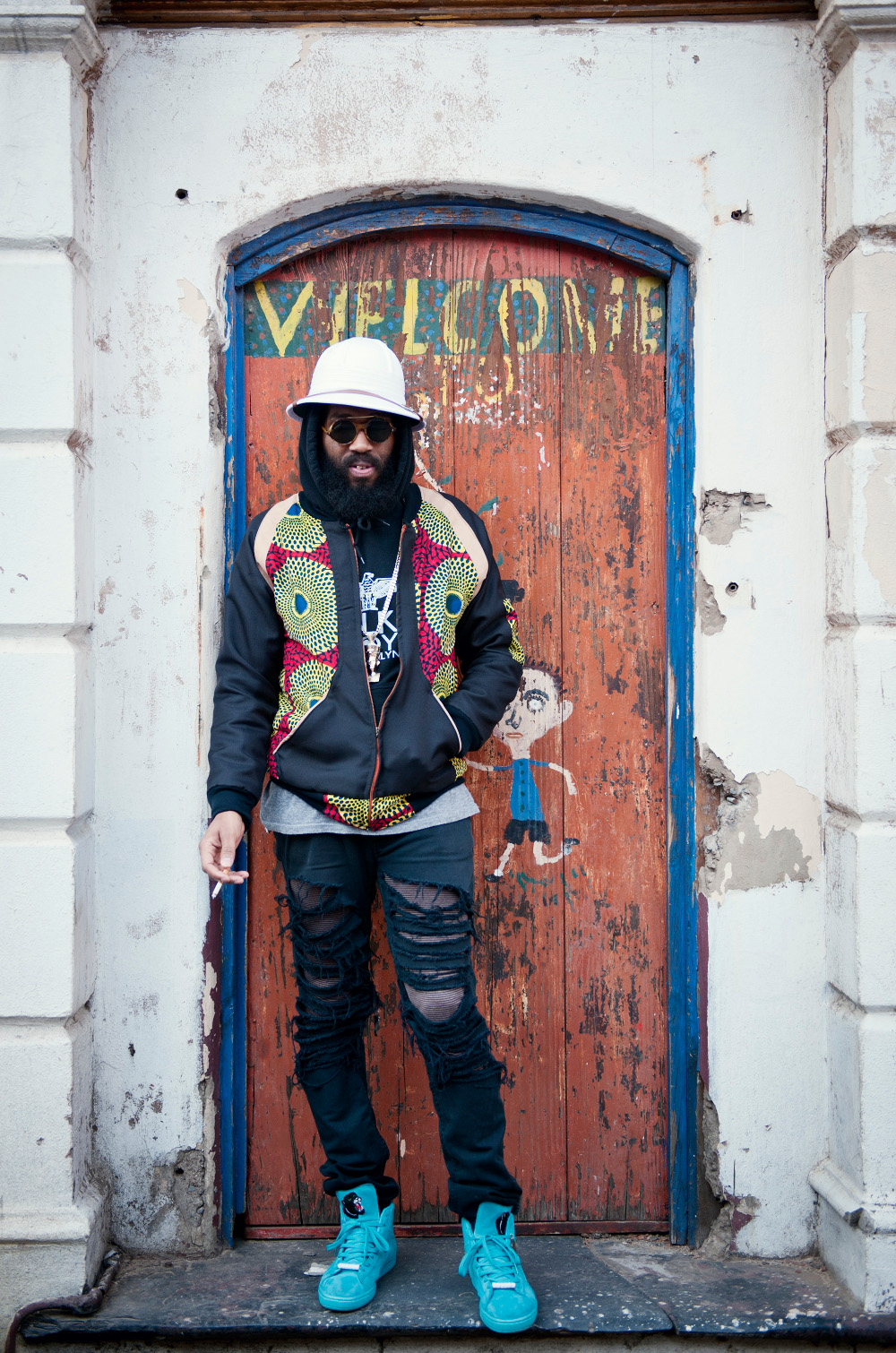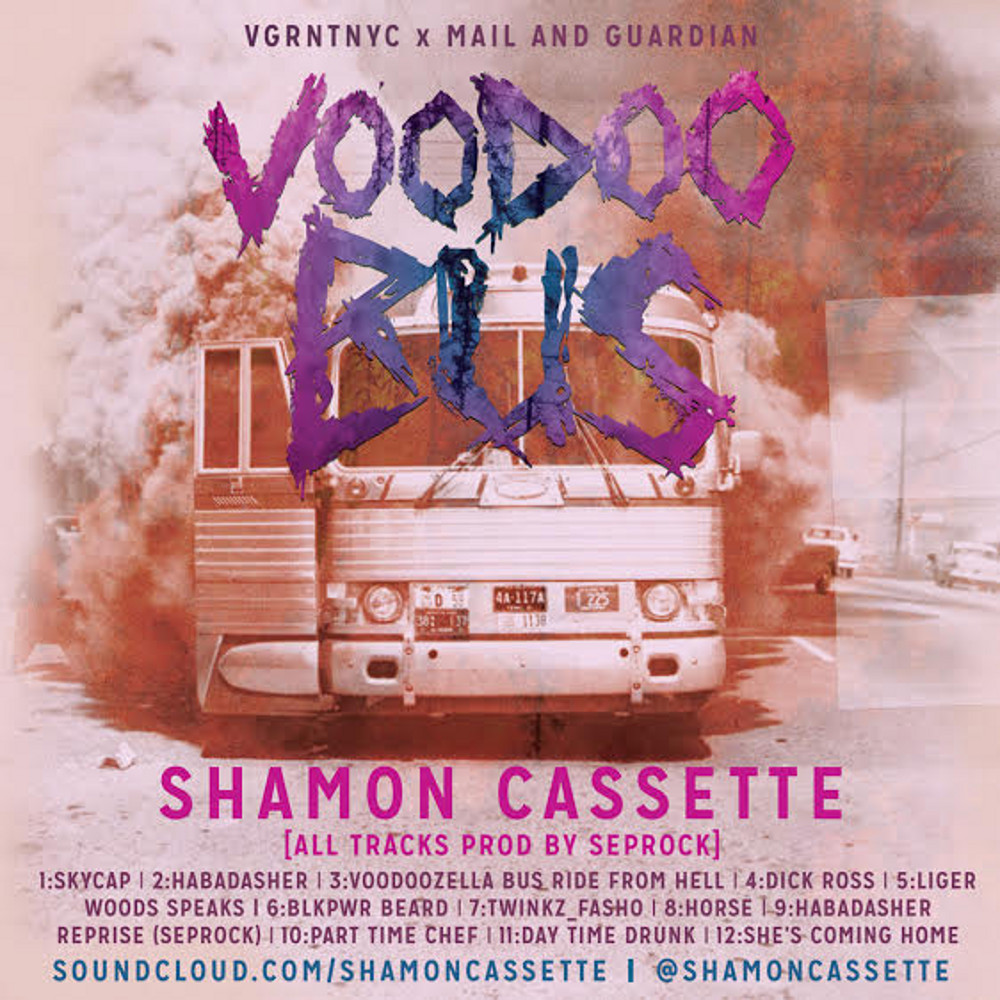Download Shamon Cassette's latest 'Voodoo Bus'.
“I call myself a ‘rapper-haberdasher’,” quips the loud-print-wearing, big-bearded Shamon Cassette.
It’s clear that the Brooklyn-based fashion designer and musician is part of today’s slash generation, who wear their titles like notches in their belts.
He fought in Iraq after 9/11 and I ask if “war veteran” could also be another slash title. But he says he’s “regretful of the reason we [the US] went in the war”, so “rapper-haberdasher” is what it is.
We sit down for coffee in Illovo two weeks after meeting at Johannesburg’s Maboneng precinct, which led us to a conversation on global gentrification.
“Spike Lee’s stepping in to protect and serve Brooklyn. And I’m down to protect and serve too.”
The Fashion Institute of Technology graduate laughs softy, recalling the filmmaker’s outburst over Williamsburg hipsters and the whitewashing of his New York borough.

But Cassette is a long way from Brooklyn, in South Africa recording with the Cape Town-based producer DPlanet and Red Bull Studios. The “fashion rapper”, as he sometimes refers to himself, is also in the country collaborating with fashionistas and pushing his brand VGRNTNYC.
He released a record with musician Spoek Mathambo in 2013, titled Wave Crusher, and says he feels comfortable coming back to South Africa – the country where “he has got his foot in the door”, he says.
‘Destroying and rebuilding‘
Despite his sometimes smooth, head-bopping sound and rap styles reminiscent of 1990s rap groups like KMD and A Tribe Called Quest, Cassette says his alias represents the “breaking away from the past. Destroying and rebuilding”.
Regardless of the reason for his sobriquet, Cassette’s musical past and lineage is something he holds on to dearly and tells me about proudly.
“I was born into music. My uncle is Chill EB … I started off with being in the studio with him, just learning and seeing what he was doing,” he says about his renowned rapping relative.
Cassette says he looks at history for music inspiration. “Making nostalgic music really inspires me … Afrodellic [sic] sounds from the 1970s and 1980s. Stuff from the 1990s, like snap, crackle and pop speaker sound, and the analogue, warm-speaker texture.”
And making nostalgic music is exactly what the rapper has created for Mail & Guardian readers, with his latest offering, Voodoo Bus, which was inspired by a bus trip to New Orleans last year, and was produced by Seprock.
I am catching up with the genre-twisting, analogue-watch sporting Cassette before he jets back to the US and he digs into his past to share stories of his nomadic life.
Q & A
Do you mind sharing your history?
Well, I was born in North Carolina. My mom was a soldier so we moved around to a lot of different spots – from Atlanta, to Japan, then to Texas and Germany. It was just a crazy journey.
You have got an interesting name. Where does it come from?
My name comes from breaking away from the past. Destroying and rebuilding. The name is based on the idea of destroying anything that you don’t like from you past or agree with.
And your other name?
It doesn’t even matter to me. It’s gone.”
Where’s your home?
The world is my home.
What about Brooklyn? Do you feel at home there?
Very much so. I feel so at home in Brooklyn I don’t really let the gentrification thing bother me. I mean the gentrification thing really makes me irate but everyone has their own ways of dealing with it. I think it’s important to stay informed about it and lend a hand in any type of movements aimed at quelling the gentrification. Because Brooklyn is a historical place that people want to preserve.
Can you tell me about your war experience in Iraq?
Not really because the experience is on an upcoming music project, called Wardrobe, which is coming out in the next few months. The name “Wardrobe” has a double meaning: the war I was in and the style element to my life.
Has being in the war made you less patriotic? In Cardboard Castles on Wave Crusher you question patriotism, rapping “war heroes don’t even get a memorial … they should get more cake than pro athletes.”
“Completely, I feel like being a veteran in the US is appreciated in some military towns but, in New York City, people ask: “Yo, what is a veteran?” or they ask: “A veteran of what?” It blows my mind.Veterans shouldn’t really be on the street asking for stuff. They don’t get the recognition that they deserve.
Do you regret fighting in the war?
I’m not regretful at all but I’m regretful of the reason we went in the war.
When I see you and hear your music, I’m reminded of the Kool Keiths and Taz Arnolds of this music world. Can you tell me about your influences?
It comes from the Afrodellic stuff from the 1970s and 1980s … while I’m influenced by the styling from actor Mr T and classic black films like Coming to America.
How would you describe your sound?
The music I make is fashion rap. Fashion rap is basically pulling out mad styles from your mental closet and adorning your temple, which is your body, with it. Boom! My music is very textual and it’s moody. It’s not just one genre.”
Thank you for the tape. How did Voodoo Bus come to be?
Voodoo Bus was recorded in New Orleans. It was inspired in many ways by the events that took place around April of this year. The ride there, on the bus, was insanity. Voodoozella Bus Ride from Hell is 1?000% a true story, as is 99% of the tape.
What projects are you working on?
Working at the Red Bull Studio [in Cape Town] on a project called A Beautiful Disaster with producer D Planet. It’s dark and dub sounding. It’s like the darker back side of my mind; it’s definitely there …
I’m also working on a collaborative project called MCM Paperbags with [rapper] Like from the group PacDiv. I have Wardrobe that’s coming soon. Then I’m doing some hip-house records in the UK [United Kingdom].”
Tell me more about your film solo album Cerebral Vortex and your sophomore project No Sleep till Brooklyn?
I made Cerebral Vortex off seven days of no sleep. This was seven years ago. I was still in the army at that time. Hypnotic beats and just raps.
No Sleep till Brooklyn is a tape, and Keep Following is the single, which was created into a theatre production called Keep Following. It’s a theatre production put together by a fringe theatre collective called Tremor Collective throughout New York and London.
The piece is basically a time-travelling piece. I was stuck in Berlin trying to get back to Brooklyn because there was an air traffic control strike. So for five days I would try to fly out, to no luck.
Drummer-producer Questlove says “hip-hop is inseparable from black America and black Americans, who are either creators, or consumers, or subject matter, or sometimes all three.” What kind of a legacy do you think you’ll leave behind for black children in the US, especially if you travel around so much?
Me travelling around just inspires the kids. When I’m back in Brooklyn, they always come through to me and ask me to tell about my travels.
My whole movement is igniting these kids to get out into the world and become the person that they can be. I feel that, if you don’t travel, you’re cutting off your potential as a human. There’s kids that don’t even get to leave their borough, let alone the city or the state.
Download Voodoo Bus here
